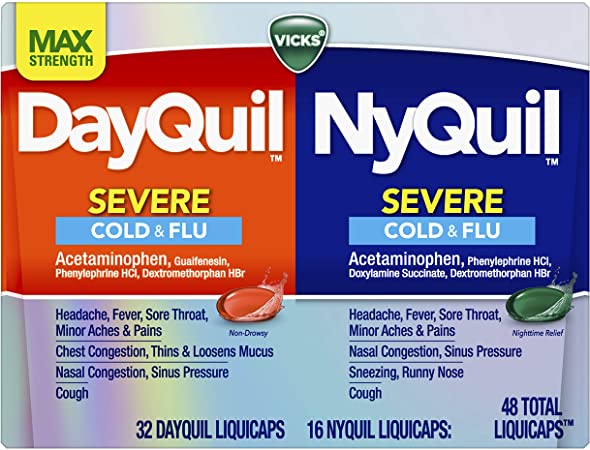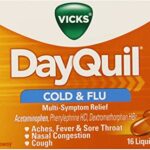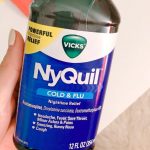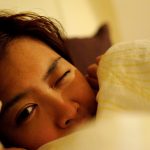Does DayQuil Keep You Awake?

A number of common medications can prevent you from falling asleep or staying asleep; others can make you groggy or sleepy during the day. Chemicals work differently on everyone, so a given medication may not affect you and your best friend the same way, but certain drugs could cause sleep problems for most people.
What is DayQuil?
DayQuil Cold & Flu is a combination product that contains the active ingredients acetaminophen, dextromethorphan, and phenylephrine. It temporarily treats symptoms of the common cold and flu. These symptoms include:
• fever
• cough
• nasal congestion
• minor aches and pains
• headache
• sore throat
DayQuil is made for use during the day. Unlike NyQuil, it doesn’t contain the active ingredient doxylamine, which is an antihistamine that can make you feel drowsy.
How does it work?
Acetaminophen is a fever reducer and a pain reliever. It works by changing the way your body senses pain. It also changes how your body regulates its temperature. Dextromethorphan suppresses your urge to cough. The third ingredient, phenylephrine, is a nasal decongestant. It reduces the swelling of the blood vessels in your nasal passages.
What are the forms and dosages?
DayQuil comes in liquid-filled capsules called LiquiCaps. It also comes as a liquid that you drink. The following table lists the recommended dosage for each form by age group. Ask your doctor for the correct dosage for children ages 4 to 5 years, and don’t give DayQuil to children who are younger than 4 years.
| Recommended dosage | LiquiCaps | Liquid |
| Adults and children 12 years and older | two capsules every 4 hours as needed, no more than four doses in 24 hours | 30 mL every 4 hours as needed, no more than 4 doses in 24 hours |
| Children ages 6-11 years | Ask your doctor | 15 mL every 4 hours as needed, no more than four doses in 24 hours |
| Children ages 4-5 years | Ask your doctor | Ask your doctor |
| Children younger than 4 years | Do not use | Do not use |
If your symptoms don’t improve or if they get worse after taking DayQuil for two days, see your doctor.
Does DayQuil Keep You Awake?
Yes, although DayQuil typically will not keep you awake if you take it at night time, it can cause sleeplessness in some people. DayQuil contains the active ingredients acetaminophen, dextromethorphan, and phenylephrine. Non-drowsy antihistamines, like dextromethorphan, can cause anxiety or jitteriness, which can lead to insomnia.
Dextromethorphan often referred to as DXM, is a morphinan class of medications with dissociative, and stimulant properties (at lower doses). Stimulants are substances that have an effect on the central nervous system and body, leading to increased alertness and difficulty in getting to sleep. This is in contrast to sedatives and hypnotics, which decrease the activity of the brain and increase sleepiness.
Once you become aware of your sleep problem and what is causing it, it is important to get professional help to manage the transition back to healthy sleep patterns. Talk to your doctor about DayQuil and how it is affecting your sleep, he or she might recommend an alternative.
If you are using alcohol, or other drugs that are contributing to sleeplessness, it is important to get proper medical support during the withdrawal process. Not only will this make it more comfortable, with fewer symptoms, but these substances can lead to severe withdrawal symptoms like seizures or psychosis that can be life-threatening without medical supervision.
Once you have discontinued DayQuil your sleep problems, your sleep patterns will take time to return to normal. Be patient.
Tips for better sleep
There are also some strategies you can take on your own to promote better sleep. Here are a few you can try, starting today:
• Establish a bedtime routine: Turn off bright screens and any sources of blue light (like TVs, laptops, or smartphones), keep your room dim or dark and engage in a calming activity like a bath, shower, or meditation.
• Avoid physical activity several hours before bedtime: Getting your heart rate up throughout the day is a great way to stay healthy and promote more sound sleep. But if you exercise too close to bedtime, your body may not have enough time to settle, which can cause trouble falling asleep.
• Avoid caffeine late in the day: Save your coffee and tea breaks for the morning and early afternoon. Caffeine too late in the evening can disrupt your sleep. If you enjoy warm tea to relax before bed, try a caffeine-free option like chamomile or lavender.





